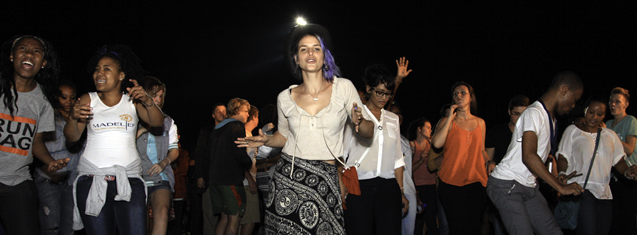
Photo: Albert van Biljon
The community of Bloemfontein came out in numbers to watch the annual Kovsie Rag procession on Saturday 1 February 2014. Young and old lined the roads around the Bloemfontein Campus to get a glimpse of the colourful floats moving through the city’s streets. Onlookers showed their support for the UFS’s charitable fun drive, dropping coins in the money tins of first-year students who made their way through the crowds.
Celebrating the hard work of students who spent hours building floats, festivities kicked off with a morning parade to Heidedal and Mangaung. Here the Rag Office distributed 10 000 meals to members of the community.
With a beloved Hollywood panda as their inspiration, JBM, Soetdoring and Imperium residences were crowned winners of the movie-themed float-building competition later the evening. Their Kung Fu Panda float led the way as the main procession made its way to the Chevrolet Cricket Stadium for a night of celebration with music stars Mango Groove, Zakes Bantwini and Robbie Wessels.
Mango Groove had the audience on their feet playing well-known hits like Special Star, Moments Away and Hometalk. Robbie Wessels and Bantwini also didn't disappoint, with the audience stomping feet to their music. In addition, partygoers were treated to an amazing fireworks display that lightened up the Bloemfontein night sky.
Float-building results:
- Overall winners: JBM, Soetdoring and Imperium
- Winners Pool A: JBM, Soetdoring and Imperium
- Winners Pool B: Welwitchia and Tswelopele
The overall assessment of floats was made up of 100 points. The impression of the floats on the little ones was very important, as children judges awarded 25% of the score. They gave a mark out of 10 and it was converted to a mark out of 25.
The assessment by the adult judges counted for 75 points. The criteria were as follows:
- General impression and colour: 25 points
- Detail: 25 points
- Did the float complement the theme: 15 points